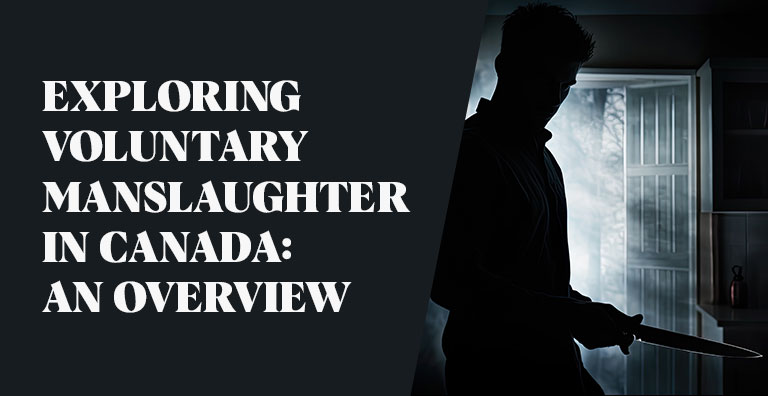Voluntary manslaughter refers to the killing of an individual without the intent to do so. This term is often misunderstood, as some people believe that voluntary manslaughter is not a crime.
However, this is far from the truth. In fact, the Canadian criminal justice system takes manslaughter charges very seriously, with the potential for life imprisonment upon conviction.
In Canada, voluntary manslaughter falls under the manslaughter laws outlined in Section 234 of the Criminal Code. If an individual is charged with voluntary manslaughter, the court must conduct a thorough investigation to determine their guilt; if found guilty, the accused may face life in prison.
This is obviously a severe consequence, and one that should not be taken lightly. As such, it is important for anyone facing such a charge to have a knowledgeable defence lawyer on their side to guide them through the legal process and ensure that their rights are protected.
If you are facing a charge of voluntary manslaughter, it is essential to understand the legal process and the potential consequences of a conviction.
In this post, our voluntary manslaughter lawyer in Brampton has gathered important information to help the accused understand the legal process and the repercussions of such a charge.
Let’s get started.
Exploring Voluntary Manslaughter in Canada: An Overview

Here, we have collected information about voluntary manslaughter that everyone should know. Keep reading to learn the details.
What Is Voluntary Manslaughter?
Also, often referred to as a ‘heat of passion’ crime, voluntary manslaughter is generally defined as the intentional killing of a person without premeditation. It is considered a serious offence, but less so than murder. Hence, if the defendant acted in the heat of passion, they may be convicted of voluntary manslaughter instead of murder.
An example of voluntary manslaughter is when a fight breaks out in a bar and someone defends themselves with their fists. If this causes the death of another, it is considered a case of ‘imperfect’ self-defence. This is where the individual might have believed they were in immediate danger, and their reaction led to the death of another.
Another instance would be a husband and wife arguing because the wife was unfaithful. They engage in a heated argument and the husband pushes the wife, who hits her head and dies. In such an instance, the crime committed by the husband is reduced from murder to manslaughter as it could have been caused by adequate provocation in the eyes of the law.
How can murder be classified as ‘voluntary manslaughter’?
Murders are typically pre-planned and the intent to kill is clear. However, there are certain instances that classify murder as voluntary manslaughter instead.
- Intention or Passion
A “crime of passion” refers to a crime committed when the person was emotional and had a strong desire to do something about their feelings. Voluntary manslaughter is considered to happen in the spur of the moment. However, their purpose is not to harm the victim. - Provocation
Provocation plays an important role in differentiating between voluntary manslaughter and murder. For instance, if someone did something to make the offender very angry before the killing, and that anger was the reason to kill the victim, then it might be considered voluntary manslaughter. This is because provocation has the power to destroy the mental state of an individual and result in them losing control.
What are the penalties for voluntary manslaughter in Canada?
There is no minimum penalty for manslaughter in Canada unless the incident involves a firearm. If convicted, you can face a maximum sentence of life in prison. The defendant would be eligible for parole only after they have served seven years of their life sentence. However, a judge has the power to delay their eligibility to 10 years (under s.743.6 of Canada’s Criminal Code).
Alternatively, if a firearm is involved in voluntary manslaughter, the convicted individual can be sentenced to a minimum of four years in prison. They are only eligible for parole after they have served one-third of their sentence.
What is the best defence for voluntary manslaughter charges?
The outcome of your voluntary manslaughter case will depend on numerous factors, such as the prosecutor’s presentation, the evidence presented, and witness testimony. However, perhaps the most important person between the judge and the individual facing a possible conviction is their manslaughter defence lawyer in Brampton. They are your best bet to achieving the best possible outcome against the penalties you face. That is why it is recommended that you hire a top criminal lawyer in Brampton who has handled voluntary manslaughter cases before. Along with defending you on your negligent manslaughter charges, they will evaluate your case and options too.
Voluntary manslaughter is a violent crime that carries serious penalties in Canada. If convicted, the defendant could be imprisoned for life. Whatever the reason for the killing, it can never be justified as the right thing to have been done. It is imperative to seek the counsel of a criminal lawyer or voluntary manslaughter defence lawyer in Brampton if faced with such charges. They will provide the legal help you need.

